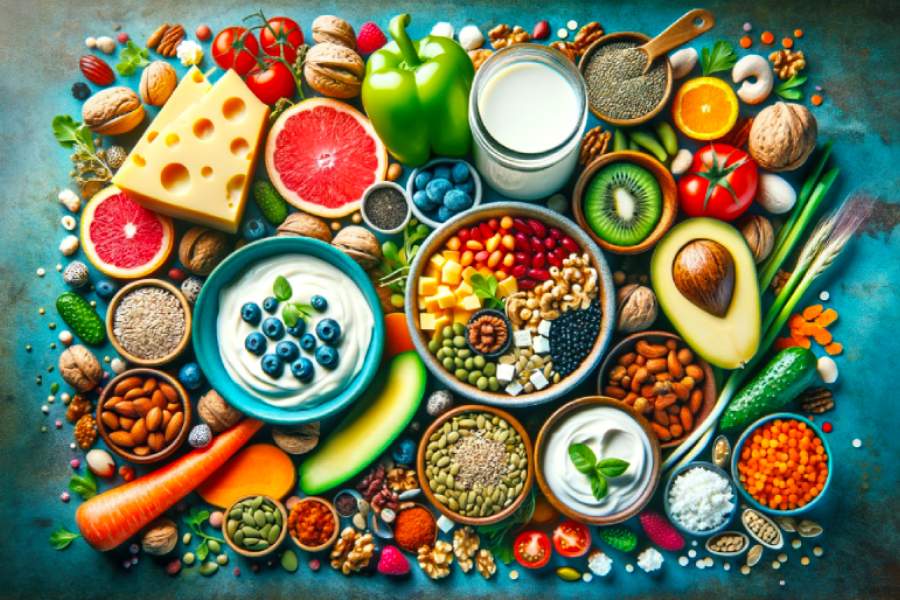To meet your individual protein needs as a vegetarian, simply eat protein-rich plant-based foods. Despite popular belief, legumes, nuts, and seeds are sufficient to ensure optimal protein intake for adults following a vegetarian diet.
Key takeaways
- Understanding Protein Needs: Calculate your protein needs or the DRI Calculator for Healthcare Professionals to estimate your daily protein requirement.
- Top Protein Sources for Vegetarians: Incorporate a variety of high-protein vegetarian foods like Dried Spirulina, Soy Protein Powder, Almond Butter, and Hemp Seeds into your diet.
- Diverse Options: A mix of legumes, nuts, seeds, and dairy products can fulfill a vegetarian’s protein needs while offering a range of other essential nutrients.
- High-Protein, Low-Calorie Choices: For those seeking low-calorie options, dairy products like Fat-free Swiss Cheese, Mozzarella (Non-Fat), and non-fat Greek Yogurt are excellent choices.
- Easy Integration in Meals: Incorporate these protein sources easily into daily meals – add nut butters to smoothies, sprinkle seeds on salads, or use them in baking.
Steps Vegetarians Should Take To Ensure They Get Proper Levels Of Protein
1) Find out how much protein you need.
The average adult’s recommended dietary allowance (RDA) is about 0.36 grams per pound.


To estimate your daily protein intake, multiply your weight in pounds by 0.36, or just use the USDA Calculator here.
.
2) Identify your favorite high-protein vegetarian foods.
Here’s a list of the top 10 high-protein foods for vegetarians Per 100 Grams:
| Rank | Food Item | Protein Content | Remarks |
| 1 | Dried Spirulina | 57.5g | Algae, rich in nutrients |
| 2 | Soy Protein Powder (Isolate) | 88.3g | Highly concentrated protein source |
| 3 | Grated Parmesan Cheese (Low-Sodium) | 41.6g | Cheese, low in sodium |
| 4 | Almond Butter | 21g | Nut butter, source of healthy fats |
| 5 | Roasted Squash and Pumpkin Seeds (Pepitas) (Salted) | 29.8g | Seeds, rich in minerals |
| 6 | Almonds | 21.2g | Nuts, high in vitamin E |
| 7 | Sun-Dried Tomatoes | 14.1g | Vegetable, rich in lycopene |
| 8 | Tahini (Sesame Butter) | 17g | Seed butter, rich in calcium |
| 9 | Flax Seeds | 18.3g | Seeds, high in omega-3 fatty acids |
| 10 | Hemp Seeds | 31.6g | Seeds, complete protein source |
For a more comprehensive list with more than 600 items, check Myfooddata.com.
3) Include high-protein plant-based foods in your diet.
Once you identify the foods you like the most, Incorporate them into your daily meals. Add almond butter to smoothies, sprinkle hemp seeds on salads, or use flax seeds in baking for an extra protein punch.
High-Protein Low-calorie Vegetarian Foods
| Rank | Food Item | Protein per 100g | Calories per 100g |
| 1 | Fat-free Swiss Cheese | 28.4g | 127 |
| 2 | Mozzarella Cheese (Non-Fat Or Fat Free) | 31.7g | 141 |
| 3 | Cheddar Cheese (Non-Fat Or Fat Free) | 32.1g | 157 |
| 4 | Low-fat Cheddar Cheese | 24.4g | 173 |
| 5 | Low-fat Ricotta | 11.4g | 138 |
| 6 | Non-fat Cottage Cheese | 10.3g | 72 |
| 7 | Low-fat Cottage Cheese (2%) | 10.5g | 81 |
| 8 | Non-fat American Cheese | 21.1g | 126 |
| 9 | Low-fat Cottage Cheese (1%) | 12.4g | 72 |
| 10 | Non-fat Greek Yogurt | 10.2g | 59 |
Source: Myfooddata.com
The combination of high protein and low calories is challenging to achieve, especially for vegetarian protein sources, as they often contain additional nutrients contributing to their caloric content.
For the most part, dairy products are the best alternative for a high-protein, low-calorie vegetarian meal.
Sources and Aditional Resources
Dietary Protein and Amino Acids in Vegetarian Diets—A Review
How much protein do you need every day?




